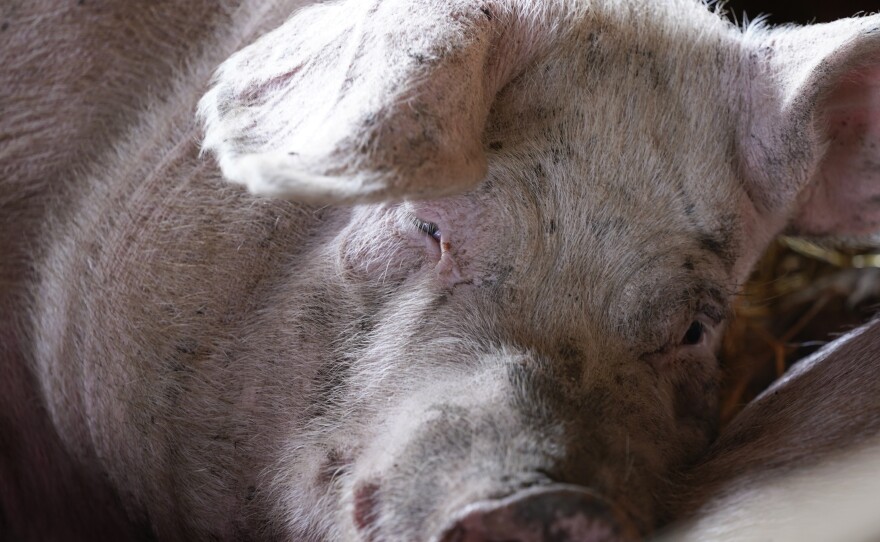On Tuesday, the US. Supreme Court will hear arguments challenging a California law that prohibits cruelty to factory farm animals. The law forbids the sale of meat and egg products in the state when animals have been confined to cruel and extreme conditions. That would include the so-called gestation crates used by most of the nation's pork producers to prevent pregnant pigs from moving until they give birth. Supporters of the California law say this case has the potential to unite conservative and liberal Justices in supporting the humane treatment of animals. But others point to the business-friendly bent of the court and say it's not likely.
Professor Glenn Smith, who teaches constitutional law at California Western School of Law, joined Midday Edition on Monday to preview the case. The conversation below has been lightly edited for clarity.
Californians voted on Prop. 12 dealing with the humane treatment of farm animals back in 2018. Can you remind us what that said?
Smith: Yes, basically — and by the way, it was supported by 63% of the voters — and it basically said that both in-state producers and out-of-state producers who sell pork in California can't confine breeding pigs in cages so that they can't lie down or move around easily. And then a second part of it that's being especially challenged now is that each breeding pig has to have at least 24 square feet of space, so six by four feet.
Can you explain a little bit more about these gestation crates and what they're like?
Smith: Well, I'm not an expert on pork production or animal safety, but basically I've seen pictures and they look very much as you would imagine. Each breeding sow is isolated in a particular cage and hundreds of them can be together but separate. And their ability to move around before Prop. 12 was passed was, at least from my layman's perspective, fairly limited.
The Prop. 12 law also prohibits the sale of things like eggs when chickens are not treated well on factory farms. Is that right?
Smith: Yes, that's true ... the (petitioner) bringing the lawsuit all throughout the levels of court and up to the Supreme Court is the National Pork Producers Council. So, the focus at the oral argument tomorrow, and in this case, is really going to be on the impact of the pork related restrictions on the industry and on animal welfare and human health.
What is the constitutional issue they claim is involved?
Smith: Well, it's a somewhat obscure one. It doesn't rip off the tongue of everyone who's thinking about free speech and whatever, but it's called the Dormant Commerce Clause. And this one, as we know, the commerce power is basically a grant of commerce regulation authority to Congress. That's what they use for Obamacare, for example. It's also been held by courts for decades to restrict the extent to which states in passing normal economic and social welfare legislation can have a negative effect on out-of-state industry. So there are several prongs of this doctrine and two of them specifically are at issue in this court case.
Can you explain the two different angles that are at issue in this court case?
Smith: Sure. The more typical one is called the Pike Balancing Test. Pike being the case, and what it basically says is if the burdens on out-of-state industry are clearly excessive in light of the benefits — so it's very burdensome but doesn't get much in the way it benefits — it's unconstitutional. That, as you can imagine, involves a lot of authority to courts to act like legislators and balance, "What are the pros and cons of this legislation?" The one that's less typical in which frankly the pork producers are trying to get the court to stretch goes by the really snappy title of the extraterritoriality doctrine. And basically, what that says is when a regulation is so extreme that it amounts to controlling the prices charged by out-of-state producers it's clearly unconstitutional and it's been a fairly limited doctrine, but the producers are trying to get it to be stretched here because the reality is the vast majority of pork that's sold in California is not produced in our state but out of state. So they claim that this law has the equivalent of basically dictating the practices and prices out of state.
But there are other California-specific laws like gasoline blends that only affect California and that the overall gas industry adapts to. Why would Prop. 12 be different?
Smith: Well, that's in fact what California argues. California argues that various major sectors of the pork production industry and various large grocery chains that buy pork have already adapted to this. And that's just what California says, that's just the normal thing that any state regulation including California has adopted for good reasons. It has the effect of making industries have to change their practices which raises prices and consumers deal with it and life goes on. What's different about this is, some of those that you mentioned, are under federal regulation and the federal government congress can give states the authority to regulate in ways that this doesn't involve the federal law. California voters did this on their own — pardon the pun — initiative. They decided to do this on their own without the cover of federal laws. That's why these doctrines apply, it's somewhat more vulnerable.
What is the Supreme Court's track record on cases involving the humane treatment of animals?
Smith: Well, I don't know that there have been a lot of humane animal treatment cases but there have been a number of Dormant Commerce Clause cases which is this doctrine. And one of the interesting things, you mentioned it at the outset, is unlike some of the big blockbuster cases on the court's term this docket, it's not one that tends to traditionally divide conservatives and liberals. You get a mix of conservative and liberals who give states rights authority and thinks if a state especially as voters want to adopt a policy that should be respected. And then you've got other liberals and conservatives who say, "No, the national economic market and market integration and all that requires that we strike down these outlying state laws." And so their track record is mixed. Often states are upheld against these challenges. Sometimes states are found to be either discriminating or unduly burdening out-of-state commerce.
Even though the court's focus may not be on the humane treatment of animals. Do you think this would impact the future of animal rights issues if this law is upheld?
Smith: Yes, as you and I have often discussed, there are the legal doctrine questions, but they're all informed by the social or economic or even moral issue behind it. And I think that's right. I think if the court upholds California, that will embolden both California and other states to take more animal rights protective measures. And on the other hand, if the court strikes it down, it will be an interference with that agenda and it will make it make legislators pause and it will make animal rights activists have to scratch their heads and figure out how to make sure they avoid this problem. So animal rights is not technically on the docket, but it certainly is informing things in the background. And by the way, I also think that certain justices will make light of California's concern and just denigrate it to typical kind of new-Age thinking or whatever, and other members on the Court will will resonate with the animal rights agenda here. And so it will be interesting to see how that works out both at tomorrow's oral argument and the ultimate decision.
And when will we hear the results? Do we have to wait until like next June or do you think it'll come out earlier?
Smith: Yes, you and I are veterans of waiting until June for these big blockbuster, controversial cases, but this one might well be decided in the next two or three months.







